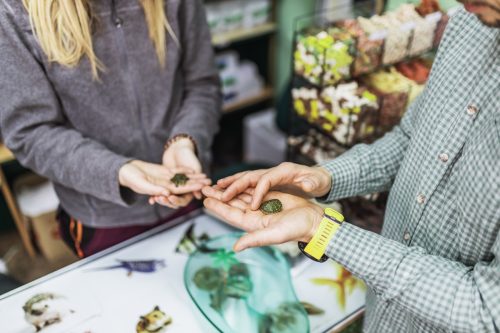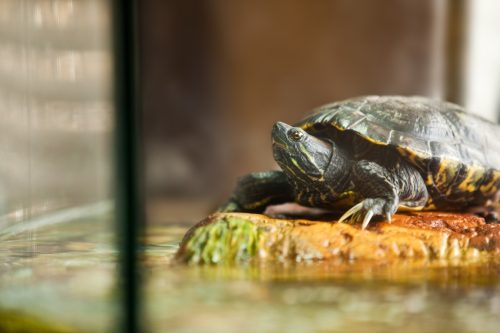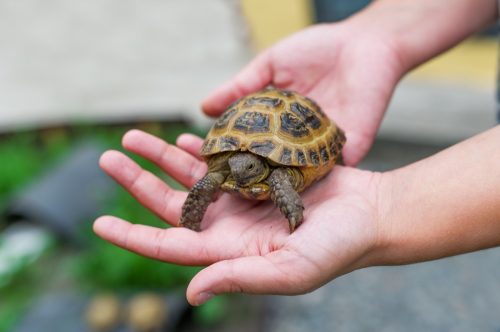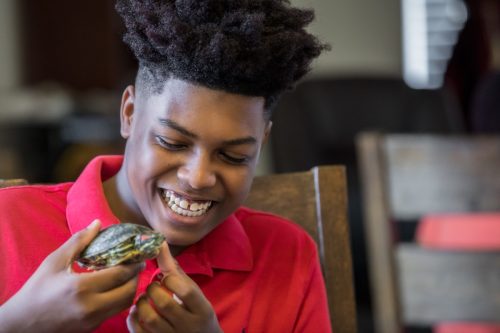The No. 1 Reason You Shouldn’t Get a Pet Turtle

Maybe you want a cool pet but can’t have a dog. Or maybe you were just heavily influenced by the Teenage Mutant Ninja Turtles. No matter the reason, it’s clear that turtles have become a popular pet, especially for families with young children. After all, these reptiles don’t need much care apart from being fed and having their tank cleaned regularly. But don’t let the low-maintenance nature of this creature lull you into a false sense of safety. Turtles actually harbor a major danger to your health, which is something you’ll want to be aware of before you make a commitment. Read on to learn from experts about the number one reason why you shouldn’t get a pet turtle.
READ THIS NEXT: The 7 Best Dogs for Beginners, Vets Say.
Many Americans have acquired pets during the pandemic.

If the increased time spent at home these past few years has pushed you towards wanting a pet, you’re hardly alone. According to a Forbes Advisor survey, about 78 percent of all pet owners in the U.S. welcomed a new animal into their lives during the pandemic. The survey also found that the younger generation has a newfound love for a more overlooked pet: turtles. The researchers found that 22 percent of Gen Z respondents—those between the ages of 18 and 25—now own a pet turtle.
“Turtles, especially small turtles, are considered to be good pets because they are cute, inexpensive, and safer than other reptiles, like snakes,” explains Kelly Johnson-Arbor, MD, a medical toxicology physician and co-medical director at National Capital Poison Center. But as Johnson-Arbor and others warn, this go-to reptile may not be as safe of a pet as many assume.
Turtles pose a major health risk.

While turtles are seemingly more easygoing than your average pet, they harbor a dangerous risk. “They do have Salmonella,” Jeff Neal, the operations manager at Critter Depot, tells Best Life. “Good husbandry can help mitigate Salmonella exposure, but even with good husbandry, turtles will still have Salmonella.”
As Johnson-Arbor further explains, this bacteria “lives in the gastrointestinal system” of a turtle, and they can carry and shed Salmonella without showing any signs of illness. “When humans handle turtles (including holding them, kissing them, and cleaning their tanks or water dishes), the Salmonella bacteria can enter the human body and cause potentially deadly disease,” she tells Best Life. “It’s actually quite easy for humans to become infected with Salmonella through contact with turtles.”
For more pet advice delivered straight to your inbox, sign up for our daily newsletter.
Children are especially at risk.

A turtle’s ability to easily spread Salmonella makes them especially risky as pets for small children, according to Neal. While anyone can get Salmonella infection, the U.S. Food and Drug Administration (FDA) warns that the risk is highest for infants, young children, pregnant people, and the elderly. According to the FDA, these are the groups of people most likely to become so sick from Salmonella infection that they need to be treated in a hospital. Symptoms of the illness usually include diarrhea, fever, stomach pain, nausea, vomiting, and headache, and they appear six to 72 hours after contact with the bacteria.
“If children come in contact with small turtles, they run the risk of becoming very ill,” Vic Boddie II, PhD, a consumer safety officer in the FDA’s Center for Veterinary Medicine, explains on the agency’s website. “And unfortunately, children will unknowingly infect themselves. Kids have the tendency to put the small turtles in their mouths or play in the turtle habitat and then put their fingers in their mouths. Also, reptile habitats are sometimes cleaned in the kitchen sink, which could cross-contaminate food and eating utensils, which can be a serious risk to both kids and the elderly.”
The CDC is currently investigating a Salmonella outbreak linked to turtles.

The Centers for Disease Control and Prevention (CDC) is actively looking into a flurry of recent Salmonella infections among people in 14 different states. According to the agency, there have been 21 illnesses reported between Jan. and July 2022, although the number of infections is likely “much higher than the number reported.” At least eight hospitalizations have occurred as a result.
Out of 14 infected people interviewed by state and local public health officials, 10 reported touching turtles before they got sick. According to the CDC, myturtlestore.com, an online retailer selling pet turtles, has been “identified as a source of illnesses in this multi-state outbreak.” The agency says that the “strain of Salmonella making people sick in this outbreak was also found at the myturtlestore.com facility.”
This is not the first time the CDC has connected Salmonella outbreaks to pet turtles. The agency found that pet turtles were likely the source of infection in 137 people throughout four outbreaks between March 2017 and Feb. 2021. “The investigations showed that shortly before many of the people became ill, they were exposed to a small turtle by touching, feeding, cleaning the habitat, or changing the water in the tank,” the FDA explains on its website.